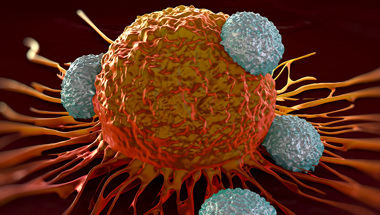Research
21 Oct 2021What has changed for men with prostate cancer since 1996?
Professor of Oncology, author and Prostate Cancer UK President and founder Jonathan Waxman reflects on prostate cancer progress since 1996, when he set up the charity after being 'outraged' at the standard of care for men.

Jonathan Waxman is always working. As a clinician he's helped develop new cancer treatments that are now part of standard practice. He's written around 400 scientific research papers and chapters, 11 books on cancer, a law book, a novel and two collections of short stories. He helped establish an All-Party Parliamentary Group to improve cancer treatment and research, and led successful media campaigns to change government policies.
We spoke to Jonathan about the outrage that drove him to start this movement 25 years ago and how things have changed since.
What motivated you to set the charity up?
When I was a junior doctor doing research on preserving fertility during chemotherapy, I’d introduced a drug which switched off the testes in men. I wondered if it could be used for prostate cancer, so men would no longer need to be treated by removing their testicles – the only option at the time apart from feminizing hormones.
I started using it in patients with prostate cancer and they began to get better, which was the most amazing thing to see. I remember the first patient, a Polish man, a lovely person – he lost all his pain, his blood tests came back normal – it was incredible.
My research was first published in 1982 and really sparked my interest in following the cause of patients with prostate cancer for the rest of my clinical life.
What were things like for a man diagnosed with prostate cancer at that time?
Today most patients are diagnosed from PSA testing, but in the 1980s most had metastatic prostate cancer (prostate cancer that’s spread to other parts of the body) so they’d go to the GP with bone pain, often having great difficulty with their lives. To diagnose them there were no MRIs – only ordinary bone scans – and an acid phosphatase test instead of PSA. When the diagnosis was confirmed they’d see a surgeon and have their balls chopped off. And that was it. It was really quite as primitive as it sounds. They’d have no palliative care input, no medical oncology. There was no support or information for them – it made me very cross.
So how did that lead to you setting up the charity?
Even after my research was published, treatment for prostate cancer didn’t change for many years. There was very little drug company interest. And there was an implacable, immeasurable resistance to change – surgeons didn’t seem to understand that removing the testicles was something men didn’t particularly like.
When I became a consultant, I specialised in prostate cancer and tried to develop research but there was no interest in funding research. Government investment was very low – only £48,000 per year compared with £4.5 million for breast cancer, which the women’s movement had really brought to the public’s attention. No money was coming from granting agencies either. I got very, very frustrated.
I happened to be friendly with some journalists who became interested in the story - there was a lot of publicity and money started to come in so I registered the charity in 1996 and started to campaign more actively.
Our biggest achievement? That people with prostate cancer are not alone anymore.
Can you say more about the early days?
My laboratory was at the Hammersmith Hospital and I used this as a showcase so people could see what could be done. That led to great funding opportunities. In the first year, we established a helpline and information service. I hired a fundraiser and a Chief Executive and we managed to raise £1.6million. We started to fund research outside of The Hammersmith too. Within a couple of years the charity was flying and we moved out of the hospital to commercial offices.
Back then, how did you see the organisation evolving?
I’d never have envisaged the organisation as it is today. At the beginning I don’t think I had much thought for the future – just a lot of energy for the present and for making things better. But a few years in, I was really ambitious for it to develop and I still am!
What aspects of our work have had the biggest impact?
For me, it’s that people with prostate cancer are not alone anymore. And the support, like our Specialist Nurses, which makes such a difference to individual lives – people need a friendly voice on the phone. Sadly some people won’t survive but at least now they know there’s support for them, there’s a community and there’s research. In 1996 there was no significant medical research being done and we’ve changed that – today there’s a huge research community. We’ve brought about a change in the environment too.
What do you think our biggest priority should be for the coming years?
It’s summarised in our ambition to stop prostate cancer killing men and damaging lives. So we need to grow our income because that will open avenues for us. Money is power.
What would you like to say to our supporters?
Thank you. We’ve done so well together and that needs to be celebrated. There have been major, wonderful changes in treatments, research, care and people’s attitudes and we’ve contributed to that. There’s a lot of good news here and we need good news this year.
We've come so far together, but we have a long way to go to see a world where lives aren't limited by prostate cancer. Help us get there with a regular gift.



